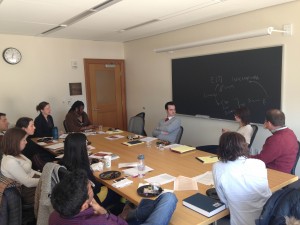On March 24, 2015, the Human Rights Program at Harvard Law School hosted Amelia Evans and Stephen Winstanley from MSI Integrity for a lunch discussion about the recently released report, “Protecting the Cornerstone: Assessing the Governance of Extractive Industries Transparency Initiative Multi-Stakeholder Groups”. While the report focuses on only the Extractive Industries Transparency Initiative (EITI), the students and faculty in the room quickly focused on the more general implications for multi-stakeholder initiatives (MSIs): that they have an inherent power imbalance amongst the different actors that participate, and internal governance rules have the potential to address some of those power imbalances.
 A number of questions were raised about how to ensure that governance rules empowered and facilitated meaningful participation from civil society and grassroots actors, as the actors that are the least well-resourced of the participants in EITI, without affecting their independence or motivation for participating. The discussion also focused on the interaction between local, national and global actors. Questions were asked about how the international organs of EITI could better incentivize or ensure that national and local actors comply with expectations, leading to conversations about the value of rigorous international monitoring and international grievance mechanisms.
A number of questions were raised about how to ensure that governance rules empowered and facilitated meaningful participation from civil society and grassroots actors, as the actors that are the least well-resourced of the participants in EITI, without affecting their independence or motivation for participating. The discussion also focused on the interaction between local, national and global actors. Questions were asked about how the international organs of EITI could better incentivize or ensure that national and local actors comply with expectations, leading to conversations about the value of rigorous international monitoring and international grievance mechanisms.
The invigorating discussion rounded up with a provocative closing question from the audience: was the low compliance with governance rules and the lack of oversight from EITI at the global level a result of poor oversight… or because of willful ignorance? A heavy question to digest on a full stomach.
